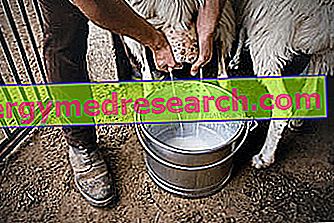
A characteristic sign of pregnancy is increased sensitivity and breast size. This change underlines how the maternal organism is preparing to supply the right nourishment to the unborn child.
Increasing breast milk production seems an important milestone for many new mothers, given the widespread and often unjustified fear that the milk produced is not sufficient to cover the nutritional needs of the baby.
How milk production is done

An aspect closely linked to the increase in milk synthesis concerns the nurse's diet. First of all it doesn't matter if in this period the feeding will be a little more abundant than usual, indeed, better, because you bring calories useful for milk production.
Negative factors on milk production
The milk produced by the mother can sometimes be insufficient due to the presence of one or more factors, such as:
- STRONG STRESS due to childbirth or pregnancy; this element greatly affects the production of breast milk;
- REDUCED MILK JET. To avoid this inconvenience it is sufficient for the mother to take water and breastfeed the baby constantly.
- HORMONAL CAUSES RELATED TO THYROID. Disorders affecting the thyroid gland may appear in the period immediately following birth or during pregnancy, with a negative effect on milk production;
- DEHYDRATION. The low introduction of liquids decreases the mother's milk production. On the other hand, drinking enough, even during the night, supports milk production. Many mothers, at the time of feeding, feel the desire to drink a lot. They can do it very well but this will not always produce more milk, on the contrary, it is important to remember that sometimes drinking too much can reduce the production of breast milk.
- ACCIDENTAL RECRUITMENT OF ANTI-GALATTOGOGUE SUBSTANCES. Some substances that hinder the production of milk can be found in some foods or drugs (see below). These anti-galactogogues counteract the production of breast milk.
- INSUFFICIENT CALORIES. It is good for the mother to take 350 to 700 extra calories daily to cover the energy needed for milk production;
- LACK OF SLEEP. Even the hours of rest affect milk production. The nurse would need to sleep 8 to 10 hours a night; this provides substantial help to milk production.
The mother can therefore maximize milk production simply by avoiding the factors just explained. Besides circumventing these obstacles, the mother can take certain foods and / or herbs that have a so-called galactagogue effect. Please note, however, that the intake of certain herbs or plant products during pregnancy and / or breastfeeding is generally not recommended. Therefore, if you intend to take them, you should always seek the advice of your doctor. Do not do your own thing.
As anticipated, the sucking of the newborn is the most important stimulus to the production of breast milk. Therefore, the excessive administration of other foods (for example the integration with artificial milk) and various feeding disturbances, such as insufficient number, inadequate time, hurriedness, uncomfortable or stressful environment, and early detachment of the small from the breast.
Foods that influence milk production
To cope with the low milk production, many mothers use a completely natural remedy. This strategy consists of taking some galactogogical foods and herbs during the entire lactation period.
Foods capable of stimulating milk production are also called galactagogues (or galactophores). In fact, there are substances - which can be synthetic or natural - whose function is to stimulate, and therefore increase, the production of breast milk.
In the human body, the most powerful galactogogic action is performed by prolactin and oxytocin. The first hormone is able to stimulate the glandular component of the breast to produce milk, while the second "squeezes" the alveoli by channeling the milk into the galactophore ducts and favoring their escape through the nipple.
Some foods that seem to be able to increase milk production are:
|
|
These foods can be taken by the mother every day without problems, with the exception of beer, allowed only once a day, in moderation (it is instead forbidden, like all other alcoholic beverages, during pregnancy).
Sage, cabbage and peppermint, instead of exhibiting a galactogogic activity, perform the reverse action, thus hindering the production of breast milk. In addition to natural products, attention must also be paid to various drugs, such as antihistamines, diuretics, hormonal contraceptives (estrogenic or estroprogestinic) and all those medicines that contain ephedrine and derivatives (prohibited during pregnancy).
Like all medical herbs, various supplements and medicines require medical approval before taking.
During breastfeeding, mothers who usually consume many coffees or caffeinated soft drinks (such as Coca-Cola) must limit the consumption of these drinks. Caffeine, in fact, reduces the production of breast milk and induces an excessive nervous stimulation of the newborn. Let it be clear that the consumption of a cup of coffee or a drink containing caffeine does not cause any problems to the mother or baby, while in case of excessive consumption the infant could be affected by the large amount of caffeine taken with milk by the nurse.
Useful tips
- To increase the production of breast milk it is important that the suction takes place immediately after the birth, and continue with a certain frequency (the WHO recommends 8 to 12 feedings per day). Equally important is that the breast does not fill too much with milk, because this induces the production of a factor (Prolactin Inibiting Factor) which is opposed to milk production. It is important, therefore, that the mother empty her breasts with a certain constancy, so as to support - and if possible increase - the production of milk, while preventing breast engorgement.
To learn more, see: number and characteristics of breastfeeds.
- Drink a lot during breastfeeding and follow a correct and healthy diet;
- Take galactogogue substances in order to increase milk production, but only after obtaining the authorization from the doctor;
- Avoid substances that can interact with milk production;
- Ensure that the mother is calm, relaxed and calmed about the suitability of the milk produced;
- The mother should rest enough, in order to recover her strength and stimulate milk production;
- The baby should spend a lot of time with the mother to strengthen the physical contact between the two.
- Within 24 hours the newborn should suck at least 8 times the mother's breast. Nighttime feedings are very useful, because in this phase the infant is more likely to suck large quantities of milk; moreover, they prevent the breasts from becoming annoyingly engorged.
- To increase milk production while avoiding nipple trauma, the position of the newborn during feeding is very important (see details);
- While waiting for it to begin or resume its production, explain to the mother how to use other types of milk to replace her own.
- Always monitor the weight, urine and faeces of the unborn child. Reduced emission of urine, hard and dry stools rarely released, insufficient growth of weight and failure to recover that at birth within 15 days of life, represent the most important signals that the newborn is not taking enough milk.
- To increase milk production the mother's motivation is also important, which must be free from the influence of negative psychological factors (refusal of the child, worry, stress, negative attitude towards breastfeeding etc.). Moral support also plays a fundamental role.



